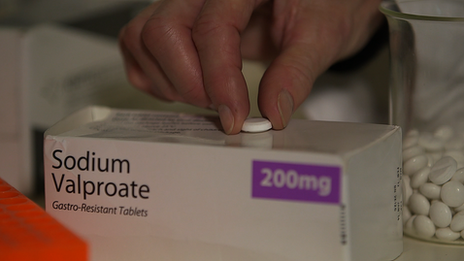Pregnant women 'unaware' of epilepsy drug risks
- Published

A new report concludes children born to mothers on sodium valproate are six times more likely to be diagnosed with disorders like autism
Concern is growing that mothers-to-be are not aware enough of the dangers of an epilepsy drug known to cause severe abnormalities in foetuses.
Sodium valproate has long been known to increase babies' risk of cleft palate and spina bifida.
Now new research has revealed some babies exposed to the drug also have mental problems and a survey found 25% of mothers were unaware of the risks.
The drug's manufacturers insist they have always warned of the dangers.
Sodium valproate is one of the most effective drugs for controlling epileptic seizures.
But it presents risks if taken by expectant mothers, with an increased chance of physical deformities.
Dr Peter Turnpenny, consultant clinical geneticist at Royal Devon and Exeter Hospital, said: "We know the risk of physical birth defect is certainly 10%.
"The increased risk of spina bifida is 20 times higher than in the background population.
"I am still seeing young children - sometimes babies - who clearly appear to be damaged by exposure to these drugs.
Birth defects
"Many of them have residual problems well into their teens and early adult life and some of them will undoubtedly not be able to lead independent lives."
A new study has found 12% of babies exposed to the drug in the womb could have mental disorders.
Speaking for the first time, its author, neuropsychologist Professor Gus Baker, said: "We followed up 600 from birth to six years of age.
"We found out that children exposed to sodium valproate were at a greater risk of intellectual delay, memory problems, language difficulties and behavioural problems."
The new report concludes children born to mothers on sodium valproate are six times more likely to be diagnosed with disorders such as autism.
Emma Murphy, who has epilepsy, has given birth to five children with health problems she believes were caused by sodium valproate.
Mrs Murphy feels she was never warned about the dangers by either her doctors or the drugs company.
She told the BBC's Inside Out London: "Symptoms my children experience are autism, cerebral palsy, deafness, incontinence, mobility issues and constant aching in their body.
"It wasn't until I was through my fourth pregnancy that I found out about the effects of Epilim (sodium valproate).

Emma Murphy, who has epilepsy, says her children have a range of disabilities
"As a mum you do have the guilt trip."
Mrs Murphy's experience is not unusual. Charities working in the sector estimate that globally thousands of children may have been harmed.
National guidelines insist all women of child-bearing age with epilepsy should be informed about the risks the drug may have on an unborn baby.
But 20 years after concerns were raised about the drug, a new study has revealed some GPs are failing to alert patients.
Reduced IQ points
Nicole Crosby-McKenna, of Epilepsy Action, said: "We did a survey of women with epilepsy and asked them about the information and counselling they receive about pregnancy.
"Over 20% of those women hadn't received any information in connection with pregnancy."
Professor Matthew Walker, head of the epilepsy department at the National Hospital for Neurology and Neurosurgery, said: "The evidence has become stronger - foetal exposure to valproate knocks somewhere between seven to 10 IQ points off the child.
"I'm finding a lot of women are not being warned about the potential risks of valproate."
Sanofi, the company that markets the drug under the brand name Epilim, has always denied liability for any birth defects.
But campaigners claim the company's warnings have always lagged behind research.
Janet Williams, of pressure group In Fact, said: "There were a lot of research papers out in the 80s and 90s when they said there was such a thing as valproate syndrome.
"But it wasn't until 2005 that they actually changed the leaflet."
A spokesman for Sanofi said: "[We] regularly review and make changes to core safety information in the light of emerging data that could have an impact on the safety profile of valproate.
"The product information made available to doctors by Sanofi in relation to sodium valproate has at all times since the product was first marketed in the early 1970s contained a warning of its teratogenic [abnormality-causing] potential."
The current leaflet provided with another brand of the drug, made by Wockhardt, clearly highlights risks to any unborn child including spina bifida, congenital abnormalities and delayed development.
But GP and broadcaster Rosemary Leonard said: "As a GP with 24 years of experience I believe the warnings on this leaflet are inadequate.
"There is no specific mention of long term learning difficulties, of low verbal IQ or autistic spectrum disorders.
"Reading this, a potential mother-to-be may well not realise the severe and extensive potential side effects that this drug can have."
A spokeswoman for Wockhardt said: "We consider that in the leaflet the patients are adequately warned.
"The patient information leaflet for sodium valproate has been approved by the medicines and healthcare products regulatory agency."
Health experts say women with epilepsy who are pregnant should not stop their medication but consult their GP or epilepsy specialist.
See more on this on Inside Out on Monday 25 February on BBC1 at 19:30 GMT.
- Published11 February 2013
- Published3 February 2013
- Published7 January 2013